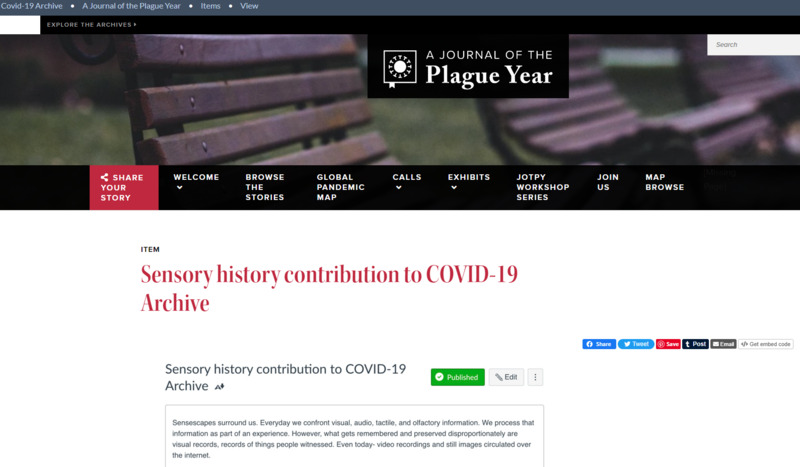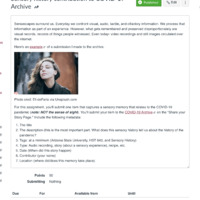Item
Sensory Roadblock: Unexpected Detriments and Benefits of Mask-wearing in Gathering Food and Information
Title (Dublin Core)
Sensory Roadblock: Unexpected Detriments and Benefits of Mask-wearing in Gathering Food and Information
Disclaimer (Dublin Core)
DISCLAIMER: This item may have been submitted in response to a school assignment prompt. See Linked Data.
Description (Dublin Core)
During the pandemic, I opted to order all of my groceries online to be delivered. I have never been much of a take-out person and mostly cook at home, so I really love to pick my ingredients when grocery shopping. Missing the in-store grocery shopping experience over the past few years, I sometimes go out to gather my fresh foods, especially after the normalizing of social distancing and mask regulations. Though I still prefer to wear a mask, even when regulations are occasionally loosened, a sensory occurrence that I did not expect to miss or lack as a consequence of mask-wearing is the importance of smell in my food-gathering habits. Being able to check the ingredients for both flavor and freshness qualities by smelling them is such a natural instinct that most lifeforms use to find their food. I never considered myself someone who actively smells things very often, so this sensory roadblock surprised me, as I initially chose to go to the store to get better foods than those that had been delivered to me. I have often come home and found that the asparagus or meat that I had just bought had that unpleasant odor of food past its prime, even though its appearance and texture seemed just perfect. I also miss being able to smell the full intensity of the fresh-cut flower bouquets that proclaim the seasons when going out grocery shopping.
This temporary lessening of sense-of-smell from wearing a mask has been a bit of a hinderance in such ways, but it has been beneficial in many others. For example, I have dust allergies and used to become very stuffy after visiting my library due to the book dust—especially since, as a history and art history graduate student, all the books that I want or need to check out are usually the oldest or dustiest ones! Not being able to smell or breathe-in these things has helped me dramatically in my experience of information gathering. I can now spend hours looking over books that I wouldn’t have thought of opening before and have found some wonderful sources for my research. Though of course many historical texts are fully available in online formats and an invaluable resource, I often feel the same way about visiting my library as I do visiting my grocery store—I hope to find something myself that might work even better for my own project, either culinarily or academically.
This temporary lessening of sense-of-smell from wearing a mask has been a bit of a hinderance in such ways, but it has been beneficial in many others. For example, I have dust allergies and used to become very stuffy after visiting my library due to the book dust—especially since, as a history and art history graduate student, all the books that I want or need to check out are usually the oldest or dustiest ones! Not being able to smell or breathe-in these things has helped me dramatically in my experience of information gathering. I can now spend hours looking over books that I wouldn’t have thought of opening before and have found some wonderful sources for my research. Though of course many historical texts are fully available in online formats and an invaluable resource, I often feel the same way about visiting my library as I do visiting my grocery store—I hope to find something myself that might work even better for my own project, either culinarily or academically.
Date (Dublin Core)
Creator (Dublin Core)
Contributor (Dublin Core)
Event Identifier (Dublin Core)
Partner (Dublin Core)
Type (Dublin Core)
Text Story
Link (Bibliographic Ontology)
Controlled Vocabulary (Dublin Core)
Contributor's Tags (a true folksonomy) (Friend of a Friend)
Linked Data (Dublin Core)
Date Submitted (Dublin Core)
08/22/2022
Date Modified (Dublin Core)
08/31/2022
Date Created (Dublin Core)
08/22/2022
Item sets
This item was submitted on August 22, 2022 by Moss Rabbin using the form “Share Your Story” on the site “A Journal of the Plague Year”: https://covid-19archive.org/s/archive
Click here to view the collected data.

